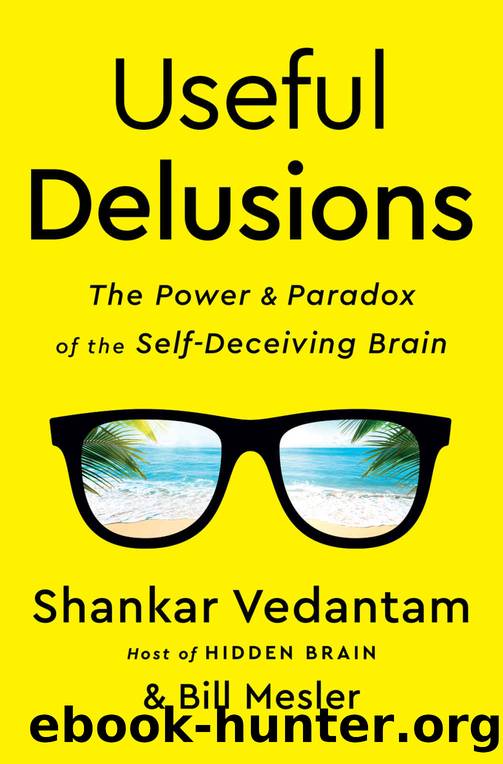Useful Delusions: The Power and Paradox of the Self-Deceiving Brain by Shankar Vedantam & Bill Mesler

Author:Shankar Vedantam & Bill Mesler [Vedantam, Shankar]
Language: eng
Format: azw3
Publisher: W. W. Norton & Company
Published: 2021-03-01T16:00:00+00:00
7
Somewhere Over the Rainbow
All are lunatics, but he who can analyze his delusion is called a philosopher.
Ambrose Bierce
In the early 1950s, a Chicago housewife named Dorothy Martinâa dabbler in automatic writing and Scientology, and, like Don Lowry, a fan of the novel Lost Horizonâbegan receiving messages beamed into her head from a distant planet called âClarion.â The messages warned that a âsupreme beingâ was going to cause a series of devastating natural disasters that would destroy the earth. Only those who joined her movement would be saved, spirited away to safety by a UFO that was to arrive at her home four days before the great cataclysm was to begin: an enormous flood that would submerge the city of Chicago on December 21, 1955.
Martinâs prophecy attracted a determined band of followers, many of whom quit their jobs and gave up their homes to prepare for the end times. Some were drawn by newspaper advertisements that proclaimed the end of the world. The advertisements also caught the eye of a young University of Minnesota psychologist named Leon Festinger, who infiltrated the group in hopes of studying the after-effects of a prophecy that failed to materialize. He fully expected Martinâs followers to lose their faith. But when December 21 came and went without floods or UFOs, the most committed of Martinâs followers grew stronger in their commitment. They doubled down.
Festinger documented his experiences in his book When Prophecies Fail. His great contribution was the concept of cognitive dissonance: It is painful to hold opposing ideas in our minds, and we seek ways to relieve this conflict. Martinâs followers deeply believed in the prophecy. If they were to admit they were wrong, they would also have to acknowledge that giving up their homes and quitting their jobs was foolish. They would have to admit their devotion to the cause was irrational and misguided. At the same time, the facts were telling them that they had made a mistake. As Festinger discovered, holding opposing notions is painful, and people look for ways to remove this source of pain. If sacrificing the facts can ease the unpleasant feeling, the facts turn out to be expendable.
Cognitive dissonance helps explain a lot about the worldâfrom voters who refuse to acknowledge they made a mistake in electing a demagogue to organizations that fail to back away from misguided policies, even in the face of mounting evidence. It also helps explain why members of the Church of Love continued to cling to their beliefs, even as details of the scam were revealed. As I learned the details of Joseph Enriquezâs final months as a member of the Church of Loveâand the way he looks back on those yearsâI found it hard not to think about Dorothy Martin and Leon Festinger.
Download
This site does not store any files on its server. We only index and link to content provided by other sites. Please contact the content providers to delete copyright contents if any and email us, we'll remove relevant links or contents immediately.
The Art of Thinking Clearly by Rolf Dobelli(10455)
Mindhunter: Inside the FBI's Elite Serial Crime Unit by John E. Douglas & Mark Olshaker(9324)
Change Your Questions, Change Your Life by Marilee Adams(7761)
Nudge - Improving Decisions about Health, Wealth, and Happiness by Thaler Sunstein(7694)
Mastermind: How to Think Like Sherlock Holmes by Maria Konnikova(7324)
The Power of Now: A Guide to Spiritual Enlightenment by Eckhart Tolle(5760)
Men In Love by Nancy Friday(5234)
Altered Sensations by David Pantalony(5094)
Factfulness: Ten Reasons We're Wrong About the World – and Why Things Are Better Than You Think by Hans Rosling(4737)
The Confidence Code by Katty Kay(4251)
Thinking in Bets by Annie Duke(4218)
Man and His Symbols by Carl Gustav Jung(4131)
The Worm at the Core by Sheldon Solomon(3486)
Why Buddhism is True by Robert Wright(3447)
Liar's Poker by Michael Lewis(3442)
Three Women by Lisa Taddeo(3425)
The Inner Life of Animals by Peter Wohlleben(3311)
Descartes' Error by Antonio Damasio(3271)
How Music Works by David Byrne(3262)
